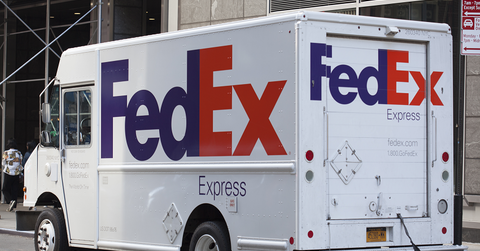FedEx Stock: Analysts’ Ratings and Target Prices
Back-to-back dismal quarterly performance and a downbeat outlook have kept analysts increasingly cautious about FedEx’s (FDX) growth prospects.
Oct. 23 2019, Published 6:19 p.m. ET

FedEx (FDX) is one of the most beaten-down stocks in the logistics industry in the last 12 months. The stock has lost 29%—nearly $16.6 billion—in market capitalization over the previous year. With its October 22 closing price of $154.63, FedEx stock was trading near its 52-week low of $137.78. Moreover, the stock is down 34% from its 52-week high of $234.49.
FedEx stock has plunged 4.2% YTD (year-to-date), underperforming the iShares Transportation Average ETF (IYT) and the broader US market. IYT, which has allocated 20% of its fund to the passenger airline industry, has gained 17% year-to-date. The major US indexes, the Dow Jones and the S&P 500, are up 14.8% and 19.5%, respectively, year-to-date.
Plus, FedEx stock has underperformed its peers. Shares of the company’s primary rival, United Parcel Service (UPS), have gained 19% year-to-date. XPO Logistics (XPO) and Old Dominion Freight Line’s (ODFL) stocks have returned 35.7% and 46.6%, respectively.
Analysts’ rating on FedEx stock
Analysts have become increasingly cautious over FedEx’s growth prospects since the beginning of 2019. Several analysts have downgraded or trimmed their target price on FedEx stock in the year so far.
Most recently, on October 9, Bernstein analyst David Vernon cut his rating on the stock to “market perform” from “outperform.” Vernon said that he has “limited confidence that the idiosyncratic issues plaguing the company will be resolved” over the next year, according to TheStreet. The analyst also lowered the target price by 24% to $153 from $201.
Over the last month, analysts from BMO Capital, Stifel Nicolaus, Edward Jones, and KeyBanc Capital have lowered their ratings and cut their target prices. All four research firms now have “neutral” or equivalent recommendations from the earlier “buy” recommendations. Although Morgan Stanley and JPMorgan Chase reiterated their “neutral” ratings, they lowered their respective target prices. Morgan Stanley cut the target price by 8.4% to $120, while JPMorgan Chase trimmed it by 13% to $146.
At the beginning of the year, about 80% of the 30 analysts covering FedEx stock had a bullish stance. However, that proportion has reduced drastically to 50% as of October 23. Moreover, their average target price on the stock fell to $171.12 from $231.37 on January 1. The current target price reflects a 10% return over the next year.
Why do analysts have a pessimistic view of FDX?
Back-to-back dismal quarterly performance reports and a downbeat outlook have kept analysts increasingly cautious about FedEx’s growth prospects. The company has reported declining bottom-line results for the last three quarters.
Moreover, its top-line growth in the previous three quarters has remained in the low single-digit range. The last three quarters’ year-over-year increase is in contrast with double-digit growth in the preceding five quarters.
Global trade and production slowdowns are impacting the delivery giant’s financial results. During its latest quarterly results, FedEx stated that negative manufacturing output in Germany hurts its European business. In Asia, the company experienced softened trade due to uncertainty over the US-China trade negotiations.
Additionally, the company’s strategy of cutting business ties with Amazon (AMZN) could hurt its near-term results. Once a customer, Amazon is now becoming a competitive threat to FedEx, as the e-commerce giant is aggressively enhancing its logistics infrastructure. Citing competitive threats, FedEx didn’t renew two delivery contracts with Amazon. The e-retailer accounts for 1.3% of FedEx’s fiscal 2019 total revenues.
FedEx expects that these factors would continue impacting its financial results throughout fiscal 2020. Therefore, it trimmed the fiscal 2020 adjusted EPS outlook to $11–$13 from the earlier projection of earnings of $15.52. Currently, Wall Street analysts are projecting earnings of $12.21 per share for fiscal 2020.
